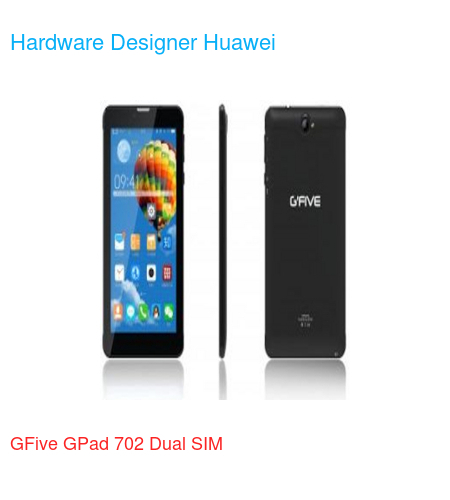| Brand | GFive |
| Model | GPad 702 Dual SIM |
| Released | 2015 Jul |
| Hardware Designer | Huawei |
| Manufacturer | Huawei |
| Device Category | Tablet |
| Depth | N/A |
| Platform | Android |
| Operating System | Google Android 4.4 (KitKat) |
| CPU Clock | 1200 MHz |
| CPU | MediaTek MT8127, 2014, 32 bit, quad-core, 512 Kbyte L2, 28 nm, ARM Mali-450 GPU |
| RAM Type | LPDDR2 SDRAM |
| RAM Capacity (converted) | 1 GiB RAM |
| Non-volatile Memory Interface | Yes |
| Non-volatile Memory Capacity (converted) | 8 GB ROM |
| Display Diagonal | 177.8 mm |
| Resolution | 600×1024 |
| Pixel Density | 170 PPI |
| Display Type | Color IPS TFT LCD display |
| Number of Display Scales | 16.8M |
| Scratch Resistant Screen | No |
| Graphical Controller | N/A |
| A/V Out | No |
| Microphone(s) | mono |
| Loudspeaker(s): | mono |
| Audio Output: | 3.5mm |
| Supported Cellular Bands | GSM850 , GSM900 , GSM1800 , GSM1900 , UMTS2100 (B1) , UMTS900 (B8) bands |
| Supported Cellular Data Links | GPRS , EDGE , UMTS , HSUPA , HSDPA , HSPA+ 21.1 data links |
| SIM Card Slot | Micro-SIM (3FF) |
| Complementary Phone Services | Speakerphone |
| Dual Cellular Network Operation | Dual standby |
| Sec. Supported Cellular Networks: | GSM850 , GSM900 , GSM1800 , GSM1900 |
| Sec. Supported Cellular Data Links: | GPRS , EDGE |
| Sec. SIM Card Slot | Micro-SIM (3FF) |
| Touchscreen Type | Capacitive multi-touch screen |
| Expansion Interfaces | TransFlash , microSD , microSDHC |
| USB | USB 2.0 |
| USB Services | USB charging |
| USB Connector | USB Micro-B (Micro-USB) |
| Bluetooth | No |
| Wireless LAN | 802.11g , 802.11n |
| FM Radio Receiver | FM radio (76-108 MHz) |
| Complementary Satellite Services | A-GPS , Geotagging , QuickGPS |
| Supported GLONASS protocol(s) | L1OF |
| Camera Placement | Rear |
| Camera Image Sensor | BSI CMOS |
| Number of effective pixels | 4.9 MP camera |
| Zoom | 1.0 x optical zoom |
| Focus | No |
| Flash | single LED |
| Aux. Camera Image Sensor | No |
| Aux. 2 Camera Image Sensor | No |
| Aux. 3 Camera Image Sensor | No |
| Aux. 4 Camera Image Sensor | No |
| Secondary Camera Placement | Front |
| Secondary Camera Sensor | CMOS |
| Secondary Camera Number of pixels | 1.9 MP sec. cam |
| Sec. Aux. Cam. Image Sensor | No |
| Built-in accelerometer | Yes |
| Additional sensors | L sensor |
| Protection from solid materials | Yes |
| Protection from liquids | Yes |
| Battery | Li-ion polymer (LiPo) |
| Market Countries | Pakistan , Saudi Arabia , UAE |
| Market Regions | Asia , Middle East |
| Added | 2024-06-13 |
Specifications data description of this 📱GFive GPad 702 Dual SIM📱
Title: The Ultimate Specification Guide for Your Device 🌐📅🏋️🌈🤖🛠️🚀🔧💪🖥️🎮🗂️📷🎥🔈📡📶💡🎁🔋🔌
Introduction:
In today’s fast-paced world, having a reliable and feature-rich device is crucial. Whether you’re a professional looking for a powerful laptop or a student searching for a high-quality smartphone, understanding the specifications of a device is a must. In this blog post, we will take a closer look at the ultimate specification guide for your device, covering all the essential aspects of a device including 🌐NETWORK, LAUNCH📅, BODY🏋️, 🌈 DISPLAY, 🤖 OS 🛠️, 🚀 Chipset 🔧, 💪 CPU 🖥️, 🎮 GPU 💻, 🧠 MEMORY 🗂️, 📷 CAMERA 🎥, 🔈 SOUND 🎵, 📡 COMMS 📶, 💡 FEATURES 🎁, 🔋 BATTERY🔌.
Lineup:
The first thing to consider when looking at a device is its lineup. This refers to the series or generation of the device, and it can help you determine whether the device is up-to-date or not. Some popular lineups include iPhone, Samsung Galaxy, and Google Pixel.
Design:
The design of a device is also an essential factor to consider, as it can affect your overall user experience. The design includes elements such as the materials used, size and weight, and color options.
Specifications:
Specifications refer to the technical aspects of a device, such as its capabilities and features. Here’s a closer look at some of the essential specifications to consider:
* 🌐NETWORK: Look for a device with fast and reliable network connectivity, such as 4G LTE or 5G.
* LAUNCH📅: Check the device’s launch date to ensure that it’s up-to-date.
* 🏋️BODY: Consider factors such as size, weight, and build materials.
* 🌈 DISPLAY: Look for a high-quality display with a good resolution, brightness, and color accuracy.
* 🤖 OS 🛠️: Consider the operating system of the device, such as iOS or Android.
* 🚀 Chipset 🔧: Look for a powerful chipset that can handle the demands of heavy use.
* 💪 CPU 🖥️: Check the CPU speed and cores, as these can impact device performance.
* 🎮 GPU 💻: Look for a powerful GPU if you’re planning to use the device for gaming or graphics-intensive tasks.
* 🧠 MEMORY 🗂️: Consider the amount of RAM and storage available on the device.
* 📷 CAMERA 🎥: Look for a high-quality camera with features such as optical image stabilization and a good aperture.
* 🔈 SOUND 🎵: Consider the audio quality of the device, including the speakers and microphone.
* 📡 COMMS 📶: Check the device’s connectivity options, such as Wi-Fi, Bluetooth, and GPS.
* 💡 FEATURES 🎁: Consider any additional features, such as a fingerprint scanner, facial recognition, or water resistance.
* 🔋 BATTERY🔌: Look for a device with a long-lasting battery and fast-charging capabilities.
Conclusion:
Choosing the right device with the perfect specifications can be a daunting task, but it doesn’t have to be. By using this ultimate specification guide, you can make an informed decision when selecting your next device. Don’t forget to consider all the essential specifications, from 🌐NETWORK to 🔋 BATTERY🔌, to ensure that your device meets your needs and preferences.
We hope you find this guide helpful. Don’t hesitate to leave a comment or share your thoughts with us. Until next time! ✌️














